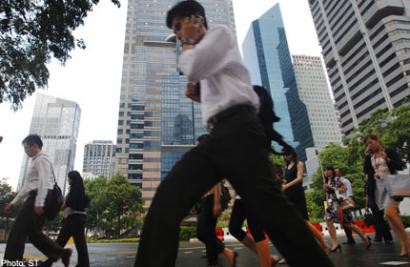S'pore ranked No 2 in global talent index

SINGAPORE - Singapore is ranked the second most competitive nation in the world when it comes to producing, attracting and retaining talent, according to a new study by Insead.
In fact, it's the only Asian country in the top 20 of the rankings that cover 103 countries representing 86.3 per cent of the world's population and 96.7 per cent of its gross domestic product, the business school said yesterday when it launched its Global Talent Competitiveness Index.
The other Asian countries ranked in the index, which is based on research and partnership with the Human Capital Leadership Institute of Singapore and Swiss human resource consultancy firm Adecco, include Japan (21), South Korea (28), Malaysia (37), Mongolia (58), Thailand (72) and the Philippines (73).
Switzerland topped the rankings, while rich European nations like Denmark (3), Sweden (4) and the Netherlands (6) dominated six of the remaining top eight positions. Apart from Singapore, the other non-European in the Top 10 is the United States.
Bruno Lanvin, Insead's executive director for global indices, said at a press conference that it's pretty obvious the rich nations have the money to produce the talent.
Insead also said in a press release that the top ranked nations have many things in common, including "a long-standing commitment to quality education (United Kingdom, Switzerland, Finland and Sweden), history of immigration (United States and Australia) and a clear strategy to grow and attract the best and the brightest (Singapore)".
The index measures a country's competitiveness based on "the quality of talent it can produce, attract and retain", said the press release.
Countries are ranked according to their scores in six "pillars" - enablers, attract, grow, retain, labour and vocational skills and global knowledge skills populated by 48 variables.
"This allows a broad combination of data measuring how a country grows, attracts and retains talent, going from government policy and quality of education to sustainability or lifestyle, for example," the press release said.
Enablers cover the regulatory, market and business landscape. Attract refers to external and internal openness. Grow reflects formal education, lifelong learning and access to growth opportunities.
Retain points to sustainability and lifestyle, while labour and vocational skills encompass employable skills and labour productivity. Global knowledge indicates higher skills and competencies and "talent impact".
Singapore ranks very highly on enablers (3rd).
"It is one of the easiest places in the world to do business with a strong and stable political setting," Insead said. "It is able to attract foreign students and is strong in higher level skills and formal education."
But Singapore can do better in internal openness, access to growth opportunities and employable skills where it scores relatively low. Also, while it is placed runner-up in the overall index and the sub-index for input, it's at No 6 on the output sub-index. But Mr Lanvin said that being a relatively new nation, it takes time for Singapore's input to be translated into output.
First-placed Switzerland tops both the input and output sub-indices. It excels in almost all the variables. The country's least convincing performance is in the attract pillar.
The Global Talent Competitiveness Index is expected to be published annually, at least for the next five years.

Get The Business Times for more stories.